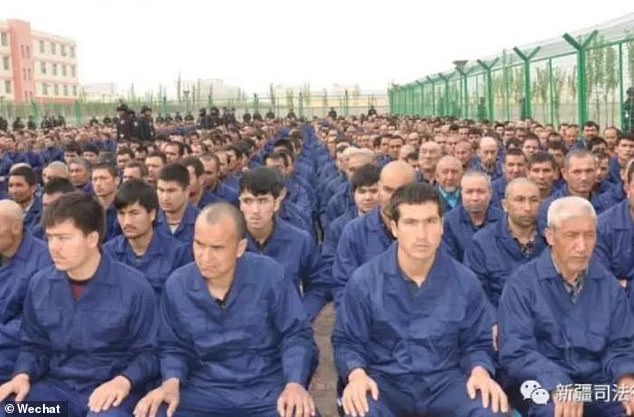
Mass sterilisation, mysterious injections, organ extractions and gang rape – these are just some of the sadistic conditions prisoners face in China, according to activists.
Horrifying accounts of sexual abuse, torture, forced confessions and human experimentation have led rights groups to accuse the country of crimes against humanity.
A shocking 2015 Amnesty International report revealed the inhumane conditions prisoners endured, and detailed how they were routinely slapped, kicked and hit with shoes or water-filled bottles.
Prisoners described being strapped in so-called ‘tiger chairs’, with their legs tied to a bench as bricks attached to the bottom of their feet forced their legs backwards, causing them unimaginable pain.
Amnesty also found that dozens of Chinese firms were producing ‘tools of torture’, ranging from electric chairs to deadly metal spiked rods.
A separate report from Human Rights Watch in 2015 claimed Chinese detainees were being beaten and hanged by their wrists.
‘Police are torturing criminal suspects to get them to confess to crimes and courts are convicting people who confessed under torture’, the report said.

Horrifying accounts of sexual abuse, torture, forced confessions and human experimentation in Chinese prisons have led rights groups to accuse the country of crimes against humanity

Illustration shows an inmate being interrogated by prison guards at a detention camp

Picture shows a ‘tiger chair’, which is specially designed to restrain prisoners
The rights group cited former detainees as saying they were physically and psychologically tortured during police interrogations, including being whacked with electric batons, sprayed with chilli oil and deprived of sleep.
Meanwhile, the UN Human Rights Council has been warned that China is actively selling human organs on an industrial scale, with body parts of prisoners – such as kidneys, livers and lungs – removed from them while they are still alive.
While Beijing has repeatedly denied accusations that it forcibly takes organs from inmates, one survivor of organ harvesting in China revealed the horrific ordeal he endured at the hands of state-sanctioned surgeons.
Between 1999 and 2006, Cheng Pei Ming faced relentless persecution for his religious and spiritual beliefs by the Chinese Communist Party, during which he is believed to have been repeatedly tortured.

Cheng Pei Ming, a survivor of forced organ harvesting in China, revealed the horrific ordeal he endured at the hands of state-sanctions surgeons

Cheng says he was taken to a hospital where doctors pressured him into signing consent forms for surgery

When he refused to sign surgery consent forms Cheng was immediately tackled by police officers and injected with a tranquilliser

He later awoke to find a huge incision down the side of his chest leaking fluid: IV lines are seen snaking into Cheng’s body following his forced surgery in 2004 in this image

Cheng’s shackles are seen on his hospital bed hours after he was operated on in China

The inception of China’s organ harvesting trade is not known but the practice gathered pace at the turn of the 21st century

About half of Cheng’s lower left lung lobe is missing

This 3D reconstruction of Cheng’s CT scan shows a considerable chunk missing from one of his lungs

A medical facility in Urumqi, captial of Xinjiang province, is seen in this image
In one of the most chilling episodes of his captivity, Cheng was taken to a hospital where doctors pressured him into signing consent forms for surgery.
When he refused, he was immediately injected with an unknown substance which knocked him out.
He awoke with a massive incision down the left side of his chest, and scans later confirmed that segments of Cheng’s liver and lung had been removed.
Images that surfaced on a website that shares information about the practice of organ harvesting clearly show an unconscious Cheng, which he suspects were taken by a shocked nurse or hospital worker.
Beijing has denied any wrongdoing, but it admitted that organs were taken out of executed prisoners up until 2015.
But many human rights organisations insist that China continues to harvest the organs of the country’s oppressed ethnic minorities held in prisons.
Internationals detained in China have also exposed the country’s vicious treatment of prisoners and its brutal psychological torture methods.
One Canadian man, who was detained by Chinese authorities for more than 1,000 days, claimed he was put into solitary confinement for months and interrogated for up to nine hours every day.

Inmates receive a psychological correctional treatment during a psychological training and consultation session at Qingpu Prison on April 8, 2005 in Shanghai, China

ormer diplomat Michael Kovrig, his wife Vina Nadjibulla and sister Ariana Botha walk following his arrival on a Canadian air force jet after his release from detention in China, at Pearson International Airport in Toronto, Ontario, Canada September 25, 2021. He described the mental torture he suffered while detained

As many as one million ethnic Uighurs and other mostly Muslim minorities are believed to be held in a network of internment camps in Xinjiang. Pictured: Workers walk by the perimeter fence of what is officially known as a vocational skills education centre in in Dabancheng, Xinjiang
Michael Kovrig, a former diplomat, was taken into custody in December 2018 in China and was accused of spying.
In an interview with the Canadian Broadcasting Corp last year, he described how there was no daylight in his solitary cell, where the fluorescent lights were kept on 24 hours a day.
At one point, his food ration was cut to three bowls of rice a day.
‘It was psychologically absolutely, the most gruelling, painful thing I’ve ever been through,’ he said.
‘It’s a combination of solitary confinement, total isolation, and relentless interrogation for six to nine hours every day,’ he said.
‘They are trying to bully and torment and terrorize and coerce you … into accepting their false version of reality.’
Another example that has sparked international condemnation are the harrowing prison camps hidden deep within the remote Xingjiang province in western China.
Branded by the government as re-education facilities, the camps are believed to hold approximately one million inmates – most of whom are Uighur Muslim – for ‘vocational training’, which the government argues is necessary in the region to alleviate poverty and fight extremism.

Illustration shows a detainee in a blue uniform kneeling down with his hands above his head

Illustration shows detainees strapped into tiger chairs as they await their confession sessions

Horrifying accounts of the inhumane conditions inmates endure in these facilities have led human rights groups to accuse China of crimes against humanity and possible genocide. Picture shows watchtowers on a high-security facility near what is believed to a re-educatiion camp on the outskirts of Hotan in Xiangjing

Sayragul Sauytbay, a Uighur Muslim, was forced into a camp in 2017. She later fled China and has bravely spoken out about her experience
The barbarity of Beijing’s clandestine prisons has been detailed by those who have been lucky enough to escape.
Sayragul Sauytbay, a Uighur Muslim, was forced into a camp in 2017, where she was made to teach other prisoners Chinese in a bid to strip them of their identity and indoctrinate them into the Communist regime.
After being released from the camp a year later, she fled China and bravely told of the savagery she witnessed in a 2019 interview with Israeli newspaper Haaretz.
She described a world where prisoners were shackled, sleep deprived and subjected to humiliating punishments inside Beijing’s brutal gulags.
In her testimony, Sauytbay also went as far as comparing the Chinese bid to crush traditional cultures in the Xinjiang region to Nazi efforts to eradicate the Jews.
During her time at the camp, she claims to have witnessed the use of mass surveillance by authorities, forced marriage, secret medical procedures, sterilisation and torture.
Sauytbay described how inmates were stripped of all of their possessions upon arrival and were handed military-style uniforms.
She also claimed that punishments were carried out in a so-called ‘black room’, a nickname given to it by prisoners because they were banned from talking about it.

Other reports have claimed that Uighur women have been forced to marry Han Chinese men

Police officers stand at the outer entrance of the Urumqi No. 3 Detention Center in Dabancheng in western China’s Xinjiang Uyghur Autonomous Region on April 23, 2021
Tortures included being forced to sit on a chair covered with nails, beatings with electrified truncheons and having fingernails torn out.
In one chillingly cruel instance, she saw an elderly woman get her skin flayed off and her fingernails ripped out for a minor act of defiance.
Describing the sleeping arrangements at the camp, Sauytbay said around 20 inmates were crammed into a room measuring 50ft by 50ft, with a single bucket for a toilet.
She also highlighted how people were constantly watched, with cameras installed in dormitories and corridors.
Women were systematically raped, she claimed, and said that she was forced to watch a woman be repeatedly assaulted.
In one instance, she saw how a woman was raped by guards as part of a forced confession.
‘While they were raping her they checked to see how we were reacting. People who turned their head or closed their eyes, and those who looked angry or shocked, were taken away and we never saw them again,’ she said.
‘It was awful. I will never forget the feeling of helplessness, of not being able to help her.’
Sauytbay also claimed that inmates were routinely starved, but on Fridays, Muslim inmates were force-fed pork and spent hours learning political slogans such as ‘I love Xi Jinping.’
Mysterious medical experiments were also commonplace, with Sauytbay witnessing how prisoners were given pills or injections.
‘Some prisoners were cognitively weakened. Women stopped getting their period and men became sterile.’
Another Uighur woman who escaped a detention camp detailed the torture and abuse she experienced at the hands of Chinese authorities.
Mihrigul Tursun told reporters in a 2018 press conference in Washington that she was interrogated for four days in a row without sleep, had her head shaved and was subjected to intrusive medical examination following her arrest the year prior.

Mihrigul Tursun, right, speaks at a event at the National Press Club in Washington, Monday, Nov. 26, 2018. Tursun, a member of China’s Uighur minority spoke of the torture and abuse she suffered at the hands Chinese authorities as part of an escalating clampdown on hundreds of thousands of members of the country’s Muslim minorities

Illustration of a suspect restrained in what the police call an ‘interrogation chair,’ but commonly known as a ‘tiger chair’

Illustration of a Chinese manufactured spiked baton
‘I thought that I would rather die than go through this torture and begged them to kill me,’ she tearfully told reporters at a meeting at the National Press Club.
She also spoke of how her and other inmates were forced to take medication, including pills that made them faint.
One day, Tursun recalled, she was led into a room and placed in a high chair, and her legs and arms were locked in place.
‘The authorities put a helmet-like thing on my head, and each time I was electrocuted, my whole body would shake violently and I would feel the pain in my veins,’ Tursun said.
‘I don’t remember the rest. White foam came out of my mouth, and I began to lose consciousness,’ Tursun said. ‘The last word I heard them saying is that you being an Uighur is a crime.’
But their account are not the only evidence of of China’s atrocious treatment of Uighur prisoners.
Drone footage released in 2019 showed apparently Uighur prisoners being unloaded from a train.

The US is among several countries to have previously accused Beijing of committing genocide in the Xinjiang province. Pictured: Uigurs learn Chinese language at reeducation camp in Xinjiang, 2019

Pictured: A re-education camp in Moyu County, Xiangjing in April 2019

. Uighurs learn the profession of electrician at reeducation camp in Moyu, Xinagjing in 2019
The detainees appeared to be blindfolded and shackled, their heads shaved.
In 2022, a series of police files obtained by the BBC revealed details of China’s use of these camps, and described the use of armed officers and a shoot-to-kill policy for those who dared escape.
Other reports have claimed that Uighur women have been forced to marry Han Chinese men, many of them government officials.
According to a report from the Uighur Human Rights Project, the Chinese government has imposed forced inter-ethnic marriages on young Uighur women under the guise of ‘promoting unity and social stability’.
But defectors claim that women who have fallen victim into coerced marriages often endure unimaginable abuse, including rape.
Another brave Chinese whistle-blower exposed the brutal tactics used by police and guards at re-education centres in Xinjiang.
The unnamed Chinese defector spoke to Sky News in 2021, in which he revealed the conditions he witnessed as a police officer in one of the prison camps.
He spoke of how prisoners were brought to the re-education facilities on crowded trains and detailed how they would be handcuffed to each other and have hoods placed over their heads to prevent them from escaping.

Beijing has denied any wrongdoing, but it admitted that organs were taken out of executed prisoners up until 2015. Pictured: Uigurs learn Chinese language at a reeducation camp

An image from inside the rarely seen confines of a detention centre, which appears to show Uyghurs being ‘re-educated’

People stand in a guard tower on the perimeter wall of the Urumqi No. 3 Detention Center in Dabancheng in western China’s Xinjiang Uyghur Autonomous Region on April 23, 2021
He also revealed how detainees would not be given food onboard the trains and would only be given minimal amounts of water.
They were also forbidden from going to the toilet ‘to keep order’.
It is believed that China implemented the use of re-education camps following an eruption of anti-government protests and deadly terror attacks.
In response, President Xi Jinping demanded an all-out ‘struggle against terrorism, infiltration and separatism’ with ‘absolutely no mercy’, according to leaked documents.
China denied the existence of camps for Uighur people for years, but when images of the centres began to emerge, Beijing changed its story.
The government now acknowledges the existence of the camps but has stood by the fact that they are ‘vocational education and training centres’ aimed at ‘stamping out extremism.’

In this image from undated video footage run by China’s CCTV via AP Video, young Muslims read from official Chinese language textbooks in classrooms at the Hotan Vocational Education and Training Center in Hotan

The demonstrators protest against the International Olympics Committee’s (IOC) decision to award 2022’s Winter Olympics to China amid the country’s record of human rights violations in Hongkong and Tibet as well as crimes against humanity against Uyghurs and other Turkic Muslims in the northwestern region of Xinjiang. February 03, 2022

A number of activists hold a demonstration against China’s policies towards Uyghur Muslims and other ethnic and religious minorities, who are suffering crimes against humanity and genocide in Jakarta, Indonesia on January 4, 2021

President Xi Jinping recently vowed to reduce corruption and improve transparency in the legal system.

China’s opaque justice system has long been criticised over the disappearance of defendants. Pictured: Guard tower and barbed wire fence are seen around a facility in Xiangjing
The crackdown is predominantly focused on the Uighurs, an ethnic minority group of about 12 million people related to the Turks.
But efforts from the Chinese government have also targeted other Muslim groups such as Kazakhs, Tajiks and Uzbeks.
And just this week, rights groups have claimed that China is preparing to dramatically scale up forced organ donations from Uighur Muslims and other persecuted minorities held in detention camps.
The claim comes after China’s National Health Commission announced plans last year to triple the number of medical facilities capable of performing organ transplants in the Xinjiang region, home to the vast majority of Uyghurs in the country.
The expanded facilities will reportedly be authorised to perform transplants of all major organs, including hearts, lungs, livers, kidneys and pancreas.
The move has prompted warnings from rights campaigners and international human rights experts who say the planned expansion aims to fuel industrial-scale organ harvesting from prisoners of conscience.
Despite China’s attempts to downplay the severity of its prisons , it recently issued a rare admission that torture and unlawful detention take place in the country’s justice system and has vowed to crack down on illegal practices by law enforcement.
The country’s opaque justice system has long been criticised over the disappearance of defendants, the targeting of dissidents and regularly forcing confessions through torture.
The country’s top prosecutorial body the Supreme People’s Procuratorate (SPP) has occasionally called out abuses while President Xi Jinping has vowed to reduce corruption and improve transparency in the legal system.
The SPP announced last week the creation of a new investigation department to target judicial officers who ‘infringe on citizens’ rights’ through unlawful detention, illegal searches and torture to extract confessions.
Its establishment ‘reflects the high importance… attached to safeguarding judicial fairness, and a clear stance on severely punishing judicial corruption’, the SPP said in a statement.
China has frequently denied allegations of torture levelled at it by the United Nations and rights bodies, particularly accusations of ill-treatment of political dissidents and minorities.

China has frequently denied allegations of torture levelled at it by the United Nations and rights bodies. Picture shows the Chinese flag behind razor wire at a housing compound in Xingjiang

Several public security officials were accused in court this month of torturing a suspect to death in 2022

Drone footage emerged showing police leading hundreds of blindfolded and shackled men from a train in what was believed to be a transfer of inmates in Xinjiang

Several recent cases involving the mistreatment of suspects have drawn public ire despite China’s strictly controlled media

The Chinese government has acknowledged the existence of the camps but has stood by the fact that they are ‘vocational education and training centres’
But several recent cases involving the mistreatment of suspects have drawn public ire despite China’s strictly controlled media.
A senior executive at a mobile gaming company in Beijing died in custody in April last year, allegedly taking his own life, after public security officials detained him for more than four months in the northern region of Inner Mongolia.
The man had been held under the residential surveillance at a designated location system, where suspects are detained incognito for long stretches without charge, access to lawyers and sometimes any contact with the outside world.
Several public security officials were accused in court this month of torturing a suspect to death in 2022, including by using electric shocks and plastic pipes, while he was held.
The SPP also released details last year of a 2019 case in which several police officers were jailed for using starvation and sleep deprivation on a suspect and restricting his access to medical treatment.
The suspect was eventually left in a ‘vegetative state’, the SPP said.
Chinese law states that torture and using violence to force confessions are punishable by up to three years in prison, with more serious punishment if the torture causes injuries or the death of the victim.






